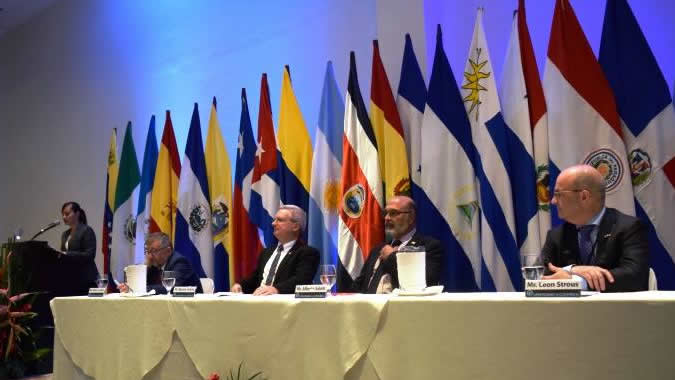13-15 Dec 2021 Online, Argentina | Conferences and meetings of subsidiary bodies
With calls to accelerate the process of digitalizing the economy of Latin America and the Caribbean and to take advantage of regional cooperation spaces for science and innovation, the Second Session of the Conference on Science, Innovation and Information and Communications Technologies (ICTs) of ECLAC and the World Information Technology Forum (WITFOR 2016) were jointly inaugurated today in San Jose, Costa Rica.
The speakers at the opening session of both gatherings were Costa Rican Minister of Science, Technology and Telecommunications, Marcelo Jenkins; the Director of ECLAC’s Production, Productivity and Management Division, Mario Cimoli; the President of the National Council of Rectors of Costa Rica (CONARE), Alberto Salom-Echeverría; and the President of the International Federation for Information Processing (IFIP), Leon Strous.
“We are witnessing how countries, despite their differences, can discuss development without setting aside the digital revolution and innovation that is taking place. The exchange of good examples, of practices that identify common areas and work agendas with a regional focus brings us together today in Costa Rica, and gives us a compass to guide our societies towards a knowledge-based economy,” said Costa Rican Minister Marcelo Jenkins.
Mario Cimoli, Director of ECLAC’s Production, Productivity and Management Division, indicated that Latin American and Caribbean countries must accelerate their efforts to take advantage of the new wave of technological innovation that is associated with the ongoing fourth industrial revolution. “The region cannot lose any more time in moving towards digitalization,” he said, in the framework of the challenges of the new 2030 Agenda for Sustainable Development.
The ECLAC official said the inclusion of new technologies in countries’ productive systems is a priority to prevent the region from continuing to be highly dependent on natural resources.
“To increase the dissemination of new technologies—especially some strategic ones such as automation and robotics, the Internet of things, and big data analytics—the promotion of public-private alliances and the integration of all actors in the digital ecosystem is essential,” along with using all possible spaces for regional cooperation, Cimoli stressed.
One of these spaces is the new Forum of the Countries of Latin America and the Caribbean on Sustainable Development, created to provide follow-up and review of implementation of the 2030 Agenda and its goals in the region.
Leon Strous, of IFIP, welcomed the participants of WITFOR 2016, which will run through Wednesday, September 14 and will bring together representatives of government, industry and ITC associations, as well as scholars, to analyze the most recent proposals aimed at achieving the Sustainable Development Goals (SDGs) promoted by the United Nations.
Meanwhile, Alberto Salom-Echeverría, of CONARE, emphasized the role of ICTs in ensuring better economic and social conditions in the region’s countries and the role of universities in producing knowledge that is at the service of sustainable development. In this sense, he said the second session of the Conference on Science, Innovation and ICTs of ECLAC is an opportunity to exchange experiences and propose concrete public policies.
The Conference was created in 2012 as a subsidiary body of ECLAC to promote the development and improvement of national policies, as well as bilateral, regional and international cooperation. The first meeting was held in Santiago, Chile, in June 2014. The session in Costa Rica is organized jointly with that country’s Ministry of Science, Technology and Telecommunications (MICITT) and has the support of the German Agency for International Cooperation (GIZ) and the European Commission.
On Tuesday, September 13, delegates from 15 countries of the region will join representatives of the private sector and international organizations to discuss the Internet’s disruptive effects on production, the on-demand economy, digital innovation and SMEs, infrastructure for hyper-connectivity, and competition and collaboration for leading digital transformation and innovation.
On this occasion, ECLAC will be presenting the documents Science, Technology and Innovation in the Digital Economy: The Situation in Latin America and the Caribbean and The State of Broadband in Latin America and the Caribbean 2016, an annual report by ECLAC’s Regional Broadband Observatory.
LIVE TRANSMISSION
All the Conference’s panels will be broadcast live via the Internet on the Web site: ://innovalac.cepal.org/2/en
EVENT PROGRAMME
Access the Conference’s full programme here: ://innovalac.cepal.org/2/en/programme
SOCIAL MEDIA
You can follow all the details of the session on social media with the hashtag #innovalac.
For queries or to arrange interviews, contact:
ECLAC’s Public Information Unit.
E-mail: prensa@cepal.org; Telephone: (56) 22210 2040.
Follow us on: Twitter, Facebook, Flickr, YouTube and Google+.



